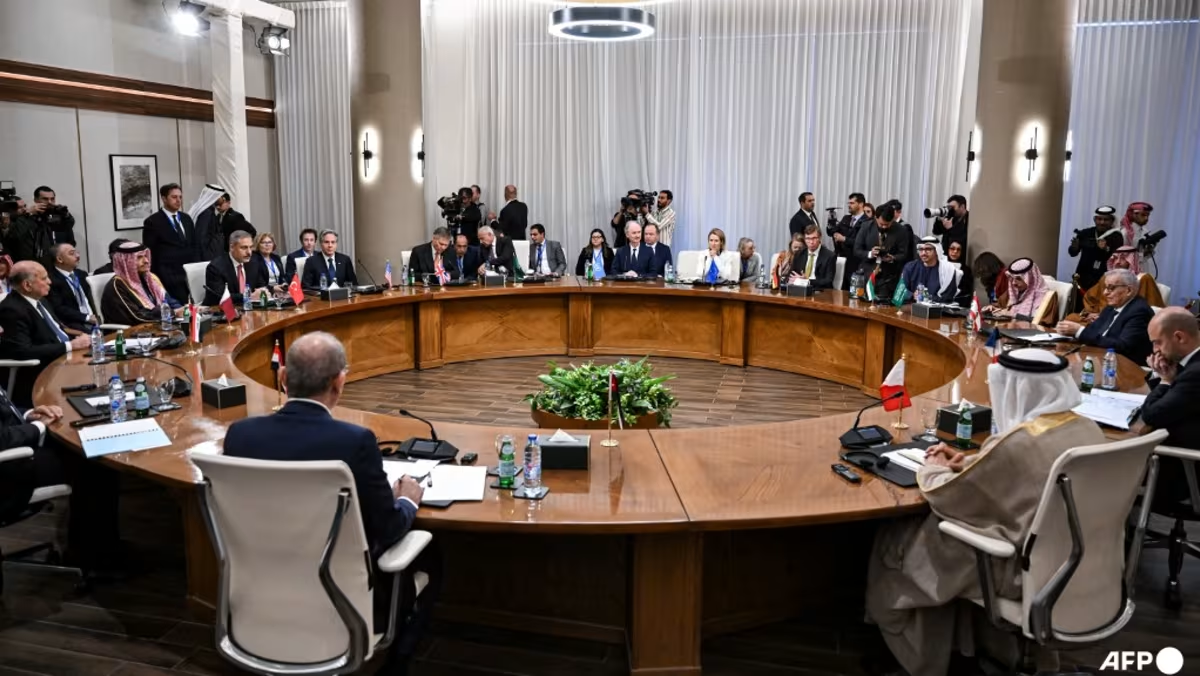Arab Ministers Rally for Inclusive Syrian Transition and Decry External Interventions

International News Department 16-12-2024

In a united diplomatic effort, senior officials from eight Arab nations reaffirmed their commitment to fostering a peaceful and inclusive political transition in Syria, while strongly condemning foreign incursions and military actions within the country. The Arab Ministerial Contact Committee on Syria convened in Aqaba, Jordan, on Saturday, bringing together foreign ministers from Bahrain, Egypt, Iraq, Jordan, Lebanon, Qatar, Saudi Arabia, and the United Arab Emirates to address the multifaceted challenges facing Syria.
The committee underscored the importance of a fair and comprehensive political solution to Syria’s ongoing crisis, rooted in the framework of United Nations Security Council Resolution 2254. This resolution calls for a ceasefire and an inclusive dialogue among all Syrian factions to chart a pathway to stability. The ministers advocated for bolstering the role of the UN Special Envoy to Syria and allocating adequate resources to establish a UN-led mission tasked with supervising and supporting the political transition process.
Condemnation of Israeli Actions
The Arab ministers issued a robust condemnation of Israeli military operations within Syrian territory, particularly its airstrikes and incursions. Reiterating their stance that the Golan Heights constitutes “occupied Arab Syrian land,” they called on the international community, especially the UN Security Council, to intervene and halt Israel’s violations of international law. These violations, the diplomats argued, extend beyond Syria to include ongoing military operations in Gaza, posing a significant threat to regional stability.
According to the Syrian Observatory for Human Rights, a UK-based monitoring group, Israel launched 61 missile strikes on Syrian military installations within a span of less than five hours on Saturday evening. Al Jazeera further reported that Israel has conducted approximately 800 airstrikes in Syria since the downfall of Bashar al-Assad’s regime on December 8, targeting critical military infrastructure and leaving Syria vulnerable to subsequent attacks.
Abu Mohammad Al-Jolani, a prominent opposition leader and key figure in the operation that led to the collapse of Assad’s government, criticized Israel’s actions as unjustifiable under the guise of security concerns. In an interview with Syria TV, he stated, “Israeli arguments have grown increasingly feeble and fail to legitimize their repeated violations. Their actions have crossed established lines of engagement, heightening the risk of unwarranted escalation in the region.”
UN Secretary-General Antonio Guterres also expressed grave concern over the ongoing breaches of Syria’s sovereignty. In a statement on Thursday, Guterres emphasized the urgent need for de-escalation across all fronts in Syria, condemning actions that contravene the 1974 Disengagement of Forces Agreement, which remains in force.
Israel’s Perspective: A Security Justification
In response to criticism, Israeli officials defended their actions, citing the “collapse of the Syrian regime” as a factor creating a security vacuum along its northern border and within the buffer zone established by the 1974 agreement. They described recent incursions into Syrian territory as “limited and temporary measures” aimed at safeguarding border security.
The United States, a staunch ally of Israel, has supported the recent Israeli takeover of parts of the Syrian side of the Golan Heights, further complicating international efforts to stabilize the region.
Challenges of Inclusivity in Peace Efforts
Arhama Siddiqa, a research fellow at the Institute of Strategic Studies Islamabad, characterized the committee’s communique as a refined but familiar reiteration of key principles: peace, inclusivity, and adherence to UNSC Resolution 2254. However, she noted that the Arab world’s increasing focus on economic priorities in the post-pandemic era has led to a cautious and sometimes superficial approach to Syria’s crisis.
“Stability is not pursued out of altruism but out of necessity,” Siddiqa remarked, pointing to the importance of regional peace as a foundation for economic recovery and collaboration. However, she warned that while inclusivity is frequently cited as a cornerstone of resolution, it remains glaringly absent in practice. “Syria’s fragmented society demands a process that actively engages opposition groups, civil society actors, and marginalized communities. Unfortunately, these voices are often sidelined in favor of expedient yet fragile agreements,” she concluded.
As the region grapples with Syria’s complex challenges, the outcomes of the Aqaba meeting highlight both the progress and the limitations of current diplomatic efforts. The call for a UN-led mission and the condemnation of external interventions reflect a renewed determination among Arab nations to address the Syrian crisis. However, the road to lasting peace and stability requires more than high-level statements; it demands actionable commitments to inclusivity and genuine engagement with all stakeholders in Syria’s future.





